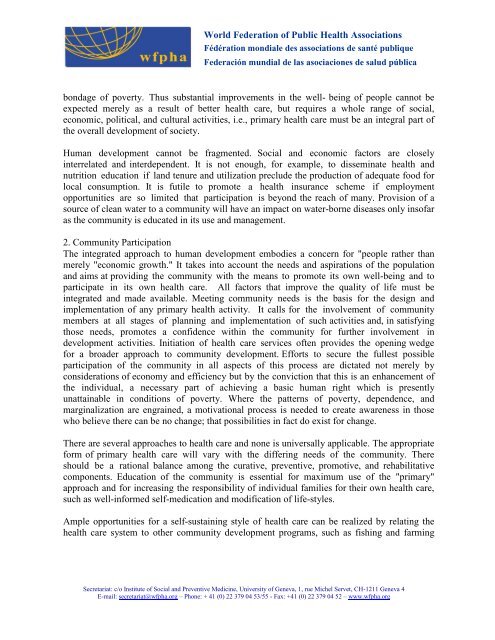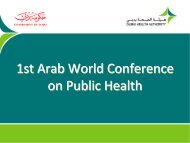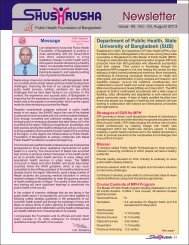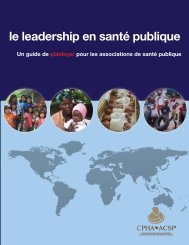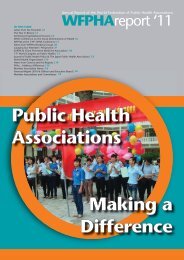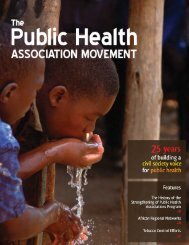Non-Governmental Organizations and Primary Health Care - World ...
Non-Governmental Organizations and Primary Health Care - World ...
Non-Governmental Organizations and Primary Health Care - World ...
You also want an ePaper? Increase the reach of your titles
YUMPU automatically turns print PDFs into web optimized ePapers that Google loves.
<strong>World</strong> Federation of Public <strong>Health</strong> AssociationsFédération mondiale des associations de santé publiqueFederación mundial de las asociaciones de salud públicabondage of poverty. Thus substantial improvements in the well- being of people cannot beexpected merely as a result of better health care, but requires a whole range of social,economic, political, <strong>and</strong> cultural activities, i.e., primary health care must be an integral part ofthe overall development of society.Human development cannot be fragmented. Social <strong>and</strong> economic factors are closelyinterrelated <strong>and</strong> interdependent. It is not enough, for example, to disseminate health <strong>and</strong>nutrition education if l<strong>and</strong> tenure <strong>and</strong> utilization preclude the production of adequate food forlocal consumption. It is futile to promote a health insurance scheme if employmentopportunities are so limited that participation is beyond the reach of many. Provision of asource of clean water to a community will have an impact on water-borne diseases only insofaras the community is educated in its use <strong>and</strong> management.2. Community ParticipationThe integrated approach to human development embodies a concern for "people rather thanmerely "economic growth." It takes into account the needs <strong>and</strong> aspirations of the population<strong>and</strong> aims at providing the community with the means to promote its own well-being <strong>and</strong> toparticipate in its own health care. All factors that improve the quality of life must beintegrated <strong>and</strong> made available. Meeting community needs is the basis for the design <strong>and</strong>implementation of any primary health activity. It calls for the involvement of communitymembers at all stages of planning <strong>and</strong> implementation of such activities <strong>and</strong>, in satisfyingthose needs, promotes a confidence within the community for further involvement indevelopment activities. Initiation of health care services often provides the opening wedgefor a broader approach to community development. Efforts to secure the fullest possibleparticipation of the community in all aspects of this process are dictated not merely byconsiderations of economy <strong>and</strong> efficiency but by the conviction that this is an enhancement ofthe individual, a necessary part of achieving a basic human right which is presentlyunattainable in conditions of poverty. Where the patterns of poverty, dependence, <strong>and</strong>marginalization are engrained, a motivational process is needed to create awareness in thosewho believe there can be no change; that possibilities in fact do exist for change.There are several approaches to health care <strong>and</strong> none is universally applicable. The appropriateform of primary health care will vary with the differing needs of the community. Thereshould be a rational balance among the curative, preventive, promotive, <strong>and</strong> rehabilitativecomponents. Education of the community is essential for maximum use of the "primary"approach <strong>and</strong> for increasing the responsibility of individual families for their own health care,such as well-informed self-medication <strong>and</strong> modification of life-styles.Ample opportunities for a self-sustaining style of health care can be realized by relating thehealth care system to other community development programs, such as fishing <strong>and</strong> farmingSecretariat: c/o Institute of Social <strong>and</strong> Preventive Medicine, University of Geneva, 1, rue Michel Servet, CH-1211 Geneva 4E-mail: secretariat@wfpha.org – Phone: + 41 (0) 22 379 04 53/55 - Fax: +41 (0) 22 379 04 52 – www.wfpha.org


